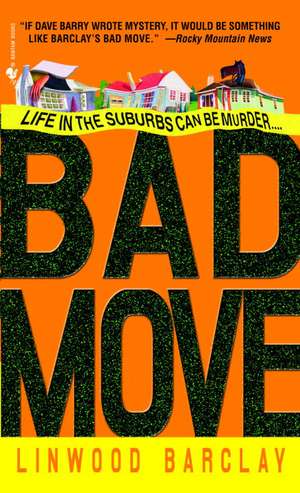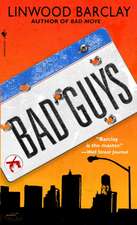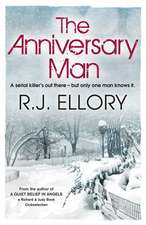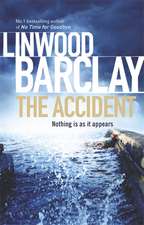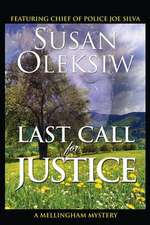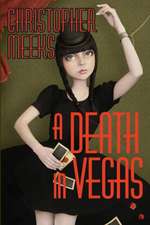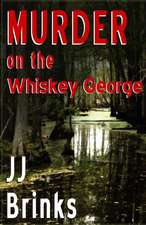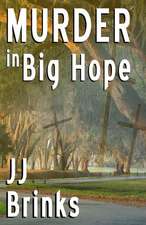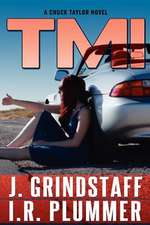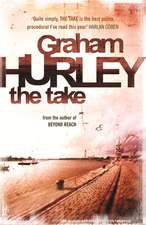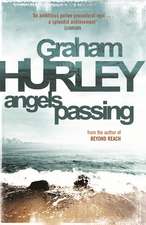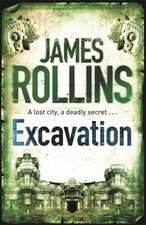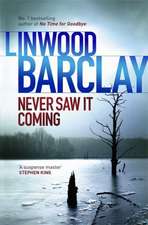Bad Move
Autor Linwood Barclayen Limba Engleză Paperback – 31 mar 2005
Zack wouldn’t blame you for thinking he’s safety-obsessed. True, he masterminded a plot to trade his family’s exciting city lifestyle for one of suburban tranquillity. True, even after this strategic move, Zack still has issues with family members who forget their keys in the front door, leave their cars unlocked, or park their backpacks at the top of the stairs—where you could kill yourself tripping over them. Just ask his wife, Sarah, or his teenage kids, Paul and Angie, who endure their share of lectures.
Zack knows that he needs to chill out and assume the best for once—but we know what happens to those who assume.
When Zack realizes their two-faced developer sent a petty thief to fix their leaky shower, he starts fighting hard to ignore the fact that Oakwood isn’t the crime-free paradise he was hoping for. But his brief state of denial comes to an abrupt end when, during a walk by the creek, he stumbles across a dead body. Even more shocking, Zack actually knows who the victim is—and who might want him dead.
With a killer roaming around their neighborhood and Zack’s overactive imagination in overdrive, he’s sure things can’t get any worse. But then another local is murdered—and Zack’s paranoid tendencies get him implicated in the crime. While his wife is trying to remember why she married him in the first place, and his kids are considering whether it’s time to have him committed, Zack decides there’s only one thing he can do. To protect his family—and avoid being busted for a crime he didn’t commit—he’s going to have to override his safety-first instincts, tap into his delusions of machismo, and track down the killer himself.
From the Hardcover edition.
| Toate formatele și edițiile | Preț | Express |
|---|---|---|
| Paperback (2) | 49.27 lei 3-5 săpt. | +25.65 lei 4-10 zile |
| Orion Publishing Group – 10 aug 2017 | 49.27 lei 3-5 săpt. | +25.65 lei 4-10 zile |
| Bantam – 31 mar 2005 | 59.83 lei 3-5 săpt. |
Preț: 59.83 lei
Nou
Puncte Express: 90
Preț estimativ în valută:
11.45€ • 11.91$ • 9.45£
11.45€ • 11.91$ • 9.45£
Carte disponibilă
Livrare economică 24 martie-07 aprilie
Preluare comenzi: 021 569.72.76
Specificații
ISBN-13: 9780553587043
ISBN-10: 0553587048
Pagini: 416
Dimensiuni: 108 x 175 x 28 mm
Greutate: 0.2 kg
Ediția:Bantam Mass Mar.
Editura: Bantam
ISBN-10: 0553587048
Pagini: 416
Dimensiuni: 108 x 175 x 28 mm
Greutate: 0.2 kg
Ediția:Bantam Mass Mar.
Editura: Bantam
Notă biografică
Linwood Barclayis a former columnist for theToronto Star. He is the #1 internationally bestselling author of many critically acclaimed novels, includingThe Accident, Never Look Away, Fear the Worst, Too Close to Home,andNo Time for Goodbye. Multiple titleshave been optioned for film.
Extras
Chapter One
for years, I envied my friend Jeff Conklin, who, at the age of eleven, found a dead guy.
We were in Grade 6, in Mr. Findley's class, and most days we walked home together, Jeff and I, but this particular day my mom picked me up after school not only because it was raining pretty hard, but also because I had a checkup booked with Dr. Murphy, our family dentist. Jeff didn't have the kind of mom who cared about picking him up at school when it was raining, so he struck out for home, no umbrella, no raincoat, stomping through all the puddles in his sneakers.
At one point, the heavens opened up and the rain came down so hard the streets flooded. I remember as we were pulling into the dentist's parking lot you couldn't see past the windshield, even with the wipers going full blast, thwacking back and forth on our 1965 Dodge Polara. It was like we weren't in a car, but in the Maid of the Mist, right under Niagara Falls.
Meanwhile, the worst of the rain had let up a bit as Jeff, now as wet as if he'd done ten laps at the community pool, rounded the corner onto Gilmour Street. Up ahead there was a blue Ford Galaxie pulled up close to the curb, and stretched out on the pavement next to it, on his stomach, was a man.
At first Jeff thought it was a kid, but kids didn't wear nice raincoats or dress pants or fancy shoes. It was a very small man. Jeff approached slowly, then stopped. The man's short legs were stretched out into the street, shoes angled awkwardly, and from where Jeff stood, it looked like his head was cut off at the curb, which really creeped Jeff out.
He took a few more steps, the world engulfed in the sound of rain, and shouted, "Mister?"
The little man said nothing, and didn't move.
"Mister? You okay?"
Now Jeff was standing right over him, and he could see that the man's chest was positioned over a storm drain where water was coursing around him and disappearing. His right arm and head were wedged into the drain. Now Jeff could see why it appeared that the man's head had been cut off.
"Mister?" he shouted one last time. Jeff confided to me that he wet his pants then, but it was okay, because he was already soaked and no one would be able to tell the difference. He ran to the closest house, banged on the door, and told the elderly man who answered that there was a dead man's head in the storm sewer. The old man had a look at the weather and decided to call the police rather than conduct his own investigation.
As best as the police could tell, this was what happened: The man--his name was Archie Roget, and he was an accountant--had left work early and was planning to run a few errands on the way home. He could tell by the approaching clouds that the light rain was about to turn into a deluge, so he pulled over to the curb to get his raincoat out of the trunk. (His wife told police he never went anywhere without a raincoat in the trunk, or a cushion on the front seat to help him see over the steering wheel.) He opened the trunk with his keys from the ignition--this was in the days before remote trunk releases--slipped on the coat, and slammed the trunk shut. Then, somehow or other, he lost his grip on the car keys, which slipped between the iron bars of the storm sewer grate. It was the kind that hugged the curb, where there was a broader vertical opening wide enough to slip an arm in, at least.
Roget got down on his hands and knees, must have been able to see his keys, and reached in. But his arm, like the rest of him, was a few inches too short, so to get a bit more length, he wedged in his head, which was, like the rest of him, tiny.
And his head got stuck.
And then the downpour struck.
Just as the wipers on my mom's car couldn't stay ahead of the rain, the storm drains couldn't empty the streets fast enough. They backed up, and Archie Roget's lungs filled with rainwater.
The circumstances of the man's death were so bizarre that the story made the papers, even hitting the wires. Jeff was interviewed not only by local reporters, but by newspapers from as far away as Spokane and Miami. He was, at least at Wendell Hills Public School, a celebrity. And if it hadn't been for my dental appointment, I might have been there to share the spotlight. This was my introduction to the cruelties of fate.
I moped around the house for nearly a week. How come I never got to find a dead guy? Why did Jeff get all the breaks? Everyone wanted to be his friend, and I tried to bask in his reflected glory. I'd tell my friends at Scouts, a different group of boys from my school friends, "You know that story, about the guy who drowned with his head in the storm drain? Well, that was my best friend who found him, and I woulda been with him, but I had to go to the dentist." No cavities, by the way. A perfect checkup. I could have skipped the appointment and it wouldn't have mattered. The ironies were enough to make an eleven-year-old's head spin.
My dad felt there was at least one lesson to be learned. "When you grow up, Zack, you remember to join the triple A. It's like insurance. If that man had belonged to the auto club, someone else would have come and got his keys for him and he'd be alive today. Don't you forget." This may have been when I started developing my lifelong obsession with safety, but more about that later.
The reason this whole thing with Jeff was such a big deal, of course, is that finding a dead body's not the sort of thing that happens to you every day. Other than Jeff, I can't think of a single friend or acquaintance who's ever stumbled upon a corpse. Not that I've asked them all. It's hardly necessary. If one of your friends finds a body, chances are good that the next time you see them, they're going to mention it. Right away. It's a great conversation starter. As in: "Oh my God, you won't believe what happened on Friday. I was taking a shortcut, that alley behind the deli? And there's these legs sticking out from behind a garbage can."
There are some body-finding circumstances I don't count. Like if you go to check on your ninety-nine-year-old Aunt Hilda, who lives alone and hasn't answered the phone for three days, and find her rigid in her favorite chair, the TV on, the remote on the floor by her feet, the cat climbing the curtains in hunger. That kind of thing happens. That's natural.
And there are certain lines of work where discovering a dead body's no big thing. Police officers come to mind. A lot of times, they're looking for a body before they actually find it, so you lose the element of surprise. Finding a body when you're already looking for a dead body isn't quite the same as when you're just out for a stroll. "Finally, there it is. Now we can get some lunch."
I'm an unlikely candidate to find a body. First of all, I'm not, unlike a police detective, in a line of work where finding a victim of foul play is a common occurrence, unless you know something about science fiction authors that I don't. And second, when I found a body, I wasn't living in some big city, where, if you believe what you see on TV, people come across dead people about as often as they go out for bagels.
I found my body in the suburbs, where, although I do not have actual statistics to back this up, people are more likely to die of boredom than run into someone nasty. I came across a corpse in as tranquil and beautiful a spot as you could hope to find.
Willow Creek, to be exact. Where my wanderings often take me. Listening to shallow water cascading over small rocks can clear the mind and help one work out plot problems. But when you're engaged in thoughts of interplanetary exploration and whether God can spread himself thin enough to oversee worlds other than our own, there's nothing like finding a guy with his skull bashed in to bring you back to reality.
He was face down, in the creek. And, unlike your typical Law & Order extra who comes upon a stranger who's had a date with destiny, I actually knew who this man was, and who might actually want him dead.
A couple of things. Despite how I envied Jeff as a kid, I'd have been happy to go through life without ever finding a dead guy. Because this discovery didn't come with the kind of notoriety Jeff received, but did carry with it the burden of adult responsibility.
And here's the other thing. If this body had been the first and last I'd ever come upon, well, this story would be much shorter. There wouldn't be all that much to tell.
But that's not the way it turned out.
2
you won't get very far into this before you start thinking that I am, not to put too fine a point on it, an asshole. At the very least, a jerk. I don't happen to think I'm an asshole, but I'm also willing to acknowledge your typical asshole's not blessed in the self-awareness department. How many assholes know they're assholes? So I guess what I'm saying is that if I know I've behaved like an asshole on certain occasions, then there's no way I could actually be one. But I'd understand if you remain unconvinced. By the time you've heard this story, you might say, "Man, that Zack Walker, he's a major one."
Let's say my motivations haven't always been fully understood or appreciated, although that sounds a bit like boneheaded politicians who lose because they fail to "communicate their message." It's fair to say my methods of instruction, of trying to teach my loved ones how to conduct themselves more responsibly, could have been better thought out. But overall, I'm not a bad guy. I've always loved my family, and all I've ever wanted was the best for them. A good life, happiness, and, above all, security. It's just that my efforts to make sure they live their lives mindful of the risks that exist out there may have occasionally overstepped the bounds, or even backfired. So I won't blame you for coming away with the impression that I've behaved as a know-it-all, a dickhead--an asshole, if you will--who, rather than going around trying to tell everyone else how to run their lives, could have benefitted from minding his own business.
My married history is littered with examples of what an enlightened asshole I am, but the pertinent examples really begin with the day I was walking back to our new home from the corner of Chancery Park and Lilac Lane, where I'd just dropped a check for our latest property tax installment into the mailbox.
The housecoat lady was watering her driveway. She did this almost daily, sometimes more than once in a given twenty-four-hour period, usually decked out in a flowered housecoat. She'd unreel the hose from its wheel beside the garage, grip the nozzle, and squeeze, forcing lawn clippings and other microscopic bits of debris down the asphalt slope toward the street. She and her husband fussed a lot with their yard, weeding, tidying up the line where lawn meets sidewalk. "Thou shalt edge" was one of their commandments, but having a perfectly clean driveway was the ultimate virtue. Free of oil stains, and, usually, of cars, it would have been an excellent place to perform surgery on a sunny day. I waved to her as I walked past and shouted "Looking good!" over the sound of the spray.
Our house is at the corner of Chancery and Greenway Lane, fronting on Greenway, and approaching our driveway I could see something shiny at the front door. Looking more closely, I could see a set of keys hanging there.
My wife Sarah's Toyota Camry had been parked beside my aging Civic while I was gone. She'd evidently gotten home from work, and must have had her hands full with her briefcase or groceries, because her keys were still hanging from the front lock. The house key was fully inserted, and dangling from the ring were the keys to her car (an actual key plus a big plastic remote thingie with buttons for doors and trunk and a red strip that would set off the alarm if you pressed it hard enough), my Civic key, and one that opened her locker at the newspaper's workout room.
This wasn't the first time she'd left the keys in the door. One morning about six weeks ago, when I went down to get the paper that not only provides us with the news, but also pays Sarah's salary, I'd found her keys hanging from the lock. She'd gotten home from work about eight the night before, which meant the keys had been dangling there more than ten hours. Not only could someone have had access to the house, but they could have stolen both cars from the driveway. I'd strolled into the kitchen with The Metropolitan and tossed it, along with the keys, onto the table in front of Sarah. She recognized the error of her ways and I got a reluctant confession out of her.
The trouble was, even this wasn't the first time. A couple of months before that, our son Paul, who's fifteen, had found her keys in the door, about five minutes after she'd come home. But that time she claimed she knew, and that she'd come through the door carrying the dry cleaning and was headed back to get them when Paul came in. Nobody bought it, but there remained an element of reasonable doubt. We weren't going to get a conviction.
Maybe that was what had happened this time. It was still possible that at any moment she'd reappear to retrieve her keys, so I decided to give her a chance. I leaned up against the rear fender of her Camry, waiting, and gazed up and down our street.
There's not much to obstruct your view. The town of Oakwood planted maples on the boulevards, between the sidewalk and the curb, to give every homeowner a tree--two, if you had a corner lot as we did--but they'd only put them in a year ago. You could wrap your hand around the trunk, thumb and index finger touching. Someday, long after Sarah and I--and probably our kids, too--are gone from the planet, they may throw a lot of shade, but for now, they're the kind of trees that create little work for neighborhood youngsters looking for raking money. And there are few cars parked on the street, except for the ones in front of Trixie's place, two doors down. She runs an accounting business from home and has clients dropping in. Many of the houses come with double, or even triple, garages, and no one's renting out their basement.
for years, I envied my friend Jeff Conklin, who, at the age of eleven, found a dead guy.
We were in Grade 6, in Mr. Findley's class, and most days we walked home together, Jeff and I, but this particular day my mom picked me up after school not only because it was raining pretty hard, but also because I had a checkup booked with Dr. Murphy, our family dentist. Jeff didn't have the kind of mom who cared about picking him up at school when it was raining, so he struck out for home, no umbrella, no raincoat, stomping through all the puddles in his sneakers.
At one point, the heavens opened up and the rain came down so hard the streets flooded. I remember as we were pulling into the dentist's parking lot you couldn't see past the windshield, even with the wipers going full blast, thwacking back and forth on our 1965 Dodge Polara. It was like we weren't in a car, but in the Maid of the Mist, right under Niagara Falls.
Meanwhile, the worst of the rain had let up a bit as Jeff, now as wet as if he'd done ten laps at the community pool, rounded the corner onto Gilmour Street. Up ahead there was a blue Ford Galaxie pulled up close to the curb, and stretched out on the pavement next to it, on his stomach, was a man.
At first Jeff thought it was a kid, but kids didn't wear nice raincoats or dress pants or fancy shoes. It was a very small man. Jeff approached slowly, then stopped. The man's short legs were stretched out into the street, shoes angled awkwardly, and from where Jeff stood, it looked like his head was cut off at the curb, which really creeped Jeff out.
He took a few more steps, the world engulfed in the sound of rain, and shouted, "Mister?"
The little man said nothing, and didn't move.
"Mister? You okay?"
Now Jeff was standing right over him, and he could see that the man's chest was positioned over a storm drain where water was coursing around him and disappearing. His right arm and head were wedged into the drain. Now Jeff could see why it appeared that the man's head had been cut off.
"Mister?" he shouted one last time. Jeff confided to me that he wet his pants then, but it was okay, because he was already soaked and no one would be able to tell the difference. He ran to the closest house, banged on the door, and told the elderly man who answered that there was a dead man's head in the storm sewer. The old man had a look at the weather and decided to call the police rather than conduct his own investigation.
As best as the police could tell, this was what happened: The man--his name was Archie Roget, and he was an accountant--had left work early and was planning to run a few errands on the way home. He could tell by the approaching clouds that the light rain was about to turn into a deluge, so he pulled over to the curb to get his raincoat out of the trunk. (His wife told police he never went anywhere without a raincoat in the trunk, or a cushion on the front seat to help him see over the steering wheel.) He opened the trunk with his keys from the ignition--this was in the days before remote trunk releases--slipped on the coat, and slammed the trunk shut. Then, somehow or other, he lost his grip on the car keys, which slipped between the iron bars of the storm sewer grate. It was the kind that hugged the curb, where there was a broader vertical opening wide enough to slip an arm in, at least.
Roget got down on his hands and knees, must have been able to see his keys, and reached in. But his arm, like the rest of him, was a few inches too short, so to get a bit more length, he wedged in his head, which was, like the rest of him, tiny.
And his head got stuck.
And then the downpour struck.
Just as the wipers on my mom's car couldn't stay ahead of the rain, the storm drains couldn't empty the streets fast enough. They backed up, and Archie Roget's lungs filled with rainwater.
The circumstances of the man's death were so bizarre that the story made the papers, even hitting the wires. Jeff was interviewed not only by local reporters, but by newspapers from as far away as Spokane and Miami. He was, at least at Wendell Hills Public School, a celebrity. And if it hadn't been for my dental appointment, I might have been there to share the spotlight. This was my introduction to the cruelties of fate.
I moped around the house for nearly a week. How come I never got to find a dead guy? Why did Jeff get all the breaks? Everyone wanted to be his friend, and I tried to bask in his reflected glory. I'd tell my friends at Scouts, a different group of boys from my school friends, "You know that story, about the guy who drowned with his head in the storm drain? Well, that was my best friend who found him, and I woulda been with him, but I had to go to the dentist." No cavities, by the way. A perfect checkup. I could have skipped the appointment and it wouldn't have mattered. The ironies were enough to make an eleven-year-old's head spin.
My dad felt there was at least one lesson to be learned. "When you grow up, Zack, you remember to join the triple A. It's like insurance. If that man had belonged to the auto club, someone else would have come and got his keys for him and he'd be alive today. Don't you forget." This may have been when I started developing my lifelong obsession with safety, but more about that later.
The reason this whole thing with Jeff was such a big deal, of course, is that finding a dead body's not the sort of thing that happens to you every day. Other than Jeff, I can't think of a single friend or acquaintance who's ever stumbled upon a corpse. Not that I've asked them all. It's hardly necessary. If one of your friends finds a body, chances are good that the next time you see them, they're going to mention it. Right away. It's a great conversation starter. As in: "Oh my God, you won't believe what happened on Friday. I was taking a shortcut, that alley behind the deli? And there's these legs sticking out from behind a garbage can."
There are some body-finding circumstances I don't count. Like if you go to check on your ninety-nine-year-old Aunt Hilda, who lives alone and hasn't answered the phone for three days, and find her rigid in her favorite chair, the TV on, the remote on the floor by her feet, the cat climbing the curtains in hunger. That kind of thing happens. That's natural.
And there are certain lines of work where discovering a dead body's no big thing. Police officers come to mind. A lot of times, they're looking for a body before they actually find it, so you lose the element of surprise. Finding a body when you're already looking for a dead body isn't quite the same as when you're just out for a stroll. "Finally, there it is. Now we can get some lunch."
I'm an unlikely candidate to find a body. First of all, I'm not, unlike a police detective, in a line of work where finding a victim of foul play is a common occurrence, unless you know something about science fiction authors that I don't. And second, when I found a body, I wasn't living in some big city, where, if you believe what you see on TV, people come across dead people about as often as they go out for bagels.
I found my body in the suburbs, where, although I do not have actual statistics to back this up, people are more likely to die of boredom than run into someone nasty. I came across a corpse in as tranquil and beautiful a spot as you could hope to find.
Willow Creek, to be exact. Where my wanderings often take me. Listening to shallow water cascading over small rocks can clear the mind and help one work out plot problems. But when you're engaged in thoughts of interplanetary exploration and whether God can spread himself thin enough to oversee worlds other than our own, there's nothing like finding a guy with his skull bashed in to bring you back to reality.
He was face down, in the creek. And, unlike your typical Law & Order extra who comes upon a stranger who's had a date with destiny, I actually knew who this man was, and who might actually want him dead.
A couple of things. Despite how I envied Jeff as a kid, I'd have been happy to go through life without ever finding a dead guy. Because this discovery didn't come with the kind of notoriety Jeff received, but did carry with it the burden of adult responsibility.
And here's the other thing. If this body had been the first and last I'd ever come upon, well, this story would be much shorter. There wouldn't be all that much to tell.
But that's not the way it turned out.
2
you won't get very far into this before you start thinking that I am, not to put too fine a point on it, an asshole. At the very least, a jerk. I don't happen to think I'm an asshole, but I'm also willing to acknowledge your typical asshole's not blessed in the self-awareness department. How many assholes know they're assholes? So I guess what I'm saying is that if I know I've behaved like an asshole on certain occasions, then there's no way I could actually be one. But I'd understand if you remain unconvinced. By the time you've heard this story, you might say, "Man, that Zack Walker, he's a major one."
Let's say my motivations haven't always been fully understood or appreciated, although that sounds a bit like boneheaded politicians who lose because they fail to "communicate their message." It's fair to say my methods of instruction, of trying to teach my loved ones how to conduct themselves more responsibly, could have been better thought out. But overall, I'm not a bad guy. I've always loved my family, and all I've ever wanted was the best for them. A good life, happiness, and, above all, security. It's just that my efforts to make sure they live their lives mindful of the risks that exist out there may have occasionally overstepped the bounds, or even backfired. So I won't blame you for coming away with the impression that I've behaved as a know-it-all, a dickhead--an asshole, if you will--who, rather than going around trying to tell everyone else how to run their lives, could have benefitted from minding his own business.
My married history is littered with examples of what an enlightened asshole I am, but the pertinent examples really begin with the day I was walking back to our new home from the corner of Chancery Park and Lilac Lane, where I'd just dropped a check for our latest property tax installment into the mailbox.
The housecoat lady was watering her driveway. She did this almost daily, sometimes more than once in a given twenty-four-hour period, usually decked out in a flowered housecoat. She'd unreel the hose from its wheel beside the garage, grip the nozzle, and squeeze, forcing lawn clippings and other microscopic bits of debris down the asphalt slope toward the street. She and her husband fussed a lot with their yard, weeding, tidying up the line where lawn meets sidewalk. "Thou shalt edge" was one of their commandments, but having a perfectly clean driveway was the ultimate virtue. Free of oil stains, and, usually, of cars, it would have been an excellent place to perform surgery on a sunny day. I waved to her as I walked past and shouted "Looking good!" over the sound of the spray.
Our house is at the corner of Chancery and Greenway Lane, fronting on Greenway, and approaching our driveway I could see something shiny at the front door. Looking more closely, I could see a set of keys hanging there.
My wife Sarah's Toyota Camry had been parked beside my aging Civic while I was gone. She'd evidently gotten home from work, and must have had her hands full with her briefcase or groceries, because her keys were still hanging from the front lock. The house key was fully inserted, and dangling from the ring were the keys to her car (an actual key plus a big plastic remote thingie with buttons for doors and trunk and a red strip that would set off the alarm if you pressed it hard enough), my Civic key, and one that opened her locker at the newspaper's workout room.
This wasn't the first time she'd left the keys in the door. One morning about six weeks ago, when I went down to get the paper that not only provides us with the news, but also pays Sarah's salary, I'd found her keys hanging from the lock. She'd gotten home from work about eight the night before, which meant the keys had been dangling there more than ten hours. Not only could someone have had access to the house, but they could have stolen both cars from the driveway. I'd strolled into the kitchen with The Metropolitan and tossed it, along with the keys, onto the table in front of Sarah. She recognized the error of her ways and I got a reluctant confession out of her.
The trouble was, even this wasn't the first time. A couple of months before that, our son Paul, who's fifteen, had found her keys in the door, about five minutes after she'd come home. But that time she claimed she knew, and that she'd come through the door carrying the dry cleaning and was headed back to get them when Paul came in. Nobody bought it, but there remained an element of reasonable doubt. We weren't going to get a conviction.
Maybe that was what had happened this time. It was still possible that at any moment she'd reappear to retrieve her keys, so I decided to give her a chance. I leaned up against the rear fender of her Camry, waiting, and gazed up and down our street.
There's not much to obstruct your view. The town of Oakwood planted maples on the boulevards, between the sidewalk and the curb, to give every homeowner a tree--two, if you had a corner lot as we did--but they'd only put them in a year ago. You could wrap your hand around the trunk, thumb and index finger touching. Someday, long after Sarah and I--and probably our kids, too--are gone from the planet, they may throw a lot of shade, but for now, they're the kind of trees that create little work for neighborhood youngsters looking for raking money. And there are few cars parked on the street, except for the ones in front of Trixie's place, two doors down. She runs an accounting business from home and has clients dropping in. Many of the houses come with double, or even triple, garages, and no one's renting out their basement.
Recenzii
"Humorous ... Fast-Paced.... the suburbs turn out to be no guarantee of personal safety."
--Booklist
Praise for Last Resort:
"Last Resort is a moving, bittersweet and naturally funny memoir of a young man's coming of age."
--London Free Press
"Engaging...Barclay writes with admirable openness about his dysfunctional family."
--Maclean's
"Barclay's straightforward and unadorned prose...lets him subtly convey the crazy-quilt way that life happens: teenage fun bumps into grownup sadness, loved ones can turn troubled or troubling...Barclay's style may seem simple, but the effects he achieves are anything but."
--January Magazine
"[Barclay] manages to capture something elusive; the magical, almost ineffable wonder of childhood, where the sense of freedom offered by a nine-horsepower boat, a summer romance or the first serious conversation with an adult offers a promise of life which one rarely shakes off in later years."
--National Post?
From the Hardcover edition.
--Booklist
Praise for Last Resort:
"Last Resort is a moving, bittersweet and naturally funny memoir of a young man's coming of age."
--London Free Press
"Engaging...Barclay writes with admirable openness about his dysfunctional family."
--Maclean's
"Barclay's straightforward and unadorned prose...lets him subtly convey the crazy-quilt way that life happens: teenage fun bumps into grownup sadness, loved ones can turn troubled or troubling...Barclay's style may seem simple, but the effects he achieves are anything but."
--January Magazine
"[Barclay] manages to capture something elusive; the magical, almost ineffable wonder of childhood, where the sense of freedom offered by a nine-horsepower boat, a summer romance or the first serious conversation with an adult offers a promise of life which one rarely shakes off in later years."
--National Post?
From the Hardcover edition.
Descriere
In one day, Zack Walter turns his model life into a disaster, so, he must do some serious damage control before his wife gets home from work. Whoever said the 'burbs were boring will think again after laughing through this hilarious page-turner.
